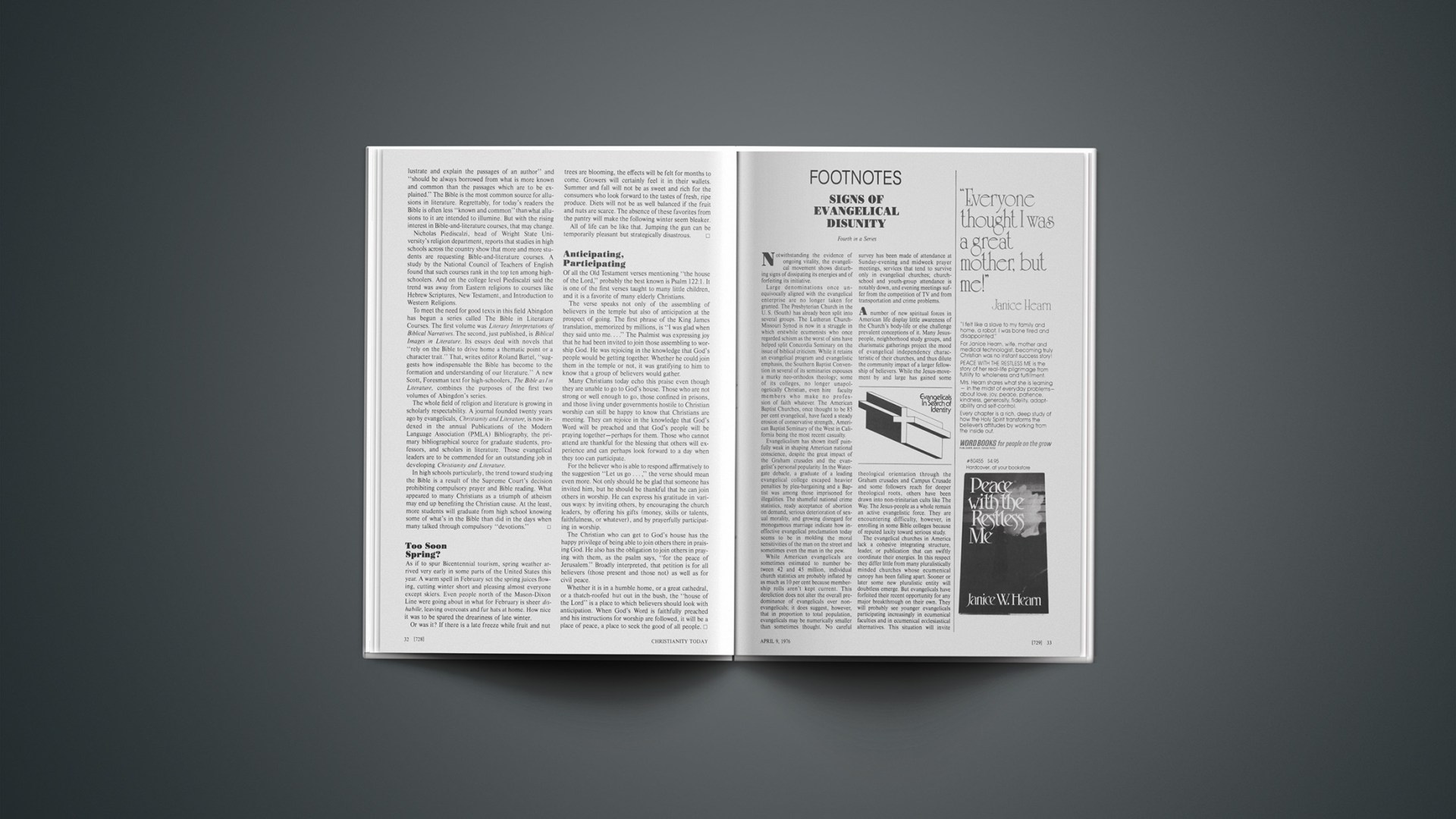Fourth in a Series
Notwithstanding the evidence of ongoing vitality, the evangelical movement shows disturbing signs of dissipating its energies and of forfeiting its initiative.
Large denominations once unequivocally aligned with the evangelical enterprise are no longer taken for granted. The Presbyterian Church in the U. S. (South) has already been split into several groups. The Lutheran Church-Missouri Synod is now in a struggle in which erstwhile ecumenists who once regarded schism as the worst of sins have helped split Concordia Seminary on the issue of biblical criticism. While it retains an evangelical program and evangelistic emphasis, the Southern Baptist Convention in several of its seminaries espouses a murky neo-orthodox theology; some of its colleges, no longer unapologetically Christian, even hire faculty members who make no profession of faith whatever. The American Baptist Churches, once thought to be 85 per cent evangelical, have faced a steady erosion of conservative strength, American Baptist Seminary of the West in California being the most recent casualty.
Evangelicalism has shown itself painfully weak in shaping American national conscience, despite the great impact of the Graham crusades and the evangelist’s personal popularity. In the Watergate debacle, a graduate of a leading evangelical college escaped heavier penalties by plea-bargaining and a Baptist was among those imprisoned for illegalities. The shameful national crime statistics, ready acceptance of abortion on demand, serious deterioration of sexual morality, and growing disregard for monogamous marriage indicate how ineffective evangelical proclamation today seems to be in molding the moral sensitivities of the man on the street and sometimes even the man in the pew.
While American evangelicals are sometimes estimated to number between 42 and 45 million, individual church statistics are probably inflated by as much as 10 per cent because membership rolls aren’t kept current. This dereliction does not alter the overall predominance of evangelicals over non-evangelicals; it does suggest, however, that in proportion to total population, evangelicals may be numerically smaller than sometimes thought. No careful survey has been made of attendance at Sunday-evening and midweek prayer meetings, services that tend to survive only in evangelical churches; church-school and youth-group attendance is notably down, and evening meetings suffer from the competition of TV and from transportation and crime problems.
A number of new spiritual forces in American life display little awareness of the Church’s body-life or else challenge prevalent conceptions of it. Many Jesus-people, neighborhood study groups, and charismatic gatherings project the mood of evangelical independency characteristic of their churches, and thus dilute the community impact of a larger fellowship of believers. While the Jesus-movement by and large has gained some theological orientation through the Graham crusades and Campus Crusade and some followers reach for deeper theological roots, others have been drawn into non-trinitarian cults like The Way. The Jesus-people as a whole remain an active evangelistic force. They are encountering difficulty, however, in enrolling in some Bible colleges because of reputed laxity toward serious study.
The evangelical churches in America lack a cohesive integrating structure, leader, or publication that can swiftly coordinate their energies. In this respect they differ little from many pluralistically minded churches whose ecumenical canopy has been falling apart. Sooner or later some new pluralistic entity will doubtless emerge. But evangelicals have forfeited their recent opportunity for any major breakthrough on their own. They will probably see younger evangelicals participating increasingly in ecumenical faculties and in ecumenical ecclesiastical alternatives. This situation will invite further disruption from the far-right and predictable losses to the left if, as remains likely, ecumenical enterprises are controlled by non-evangelicals who trade power for theological tolerance. Many young evangelical scholars want a larger vision of the Church and find little choice between an objectionable fundamentalist independency and an objectionable ecumenical pluralism. Of the two they prefer ecumenical tolerance of contradictory views instead of evangelical intolerance and uncritical acceptance of inherited traditions.
During the past decade mounting internal tension has beset the American evangelical scene. Persistent criticism has come especially from two groups of people, those who have switched to a somewhat more critical view of Scripture, and those who deplore evangelicalism’s seeming cultural captivity and lack of socio-political engagement. Both emphases have in the recent past been shared by influential evangelicals whose positive contributions to the conservative cause earlier in this century are well known to young intellectuals abreast of modern church history.
Sometimes the scriptural and the social concerns overlap, although no logical connection exists between asserting scriptural errancy and supporting neglected scriptural emphases. Those involved in the Scripture debate and in the social debate include Daniel E. Stevick (Beyond Fundamentalism, John Knox, 1964), Donald Bloesch (The Evangelical Renaissance, Eerdmans, 1973), Bernard Ramm (The Evangelical Heritage, Word, 1973), and Richard Quebedeaux (The Young Evangelicals, Harper & Row, 1974). These scholars voice many legitimate concerns—Bloesch and Ramm in a more mature and balanced way—although their allowances for biblical errancy or myth sometimes elicit diatribes against neo-evangelicals and eclipse their proper demand for evangelical reform in other matters.
More and more doctoral students now graduate from nonevangelical institutions that deplore biblical inerrancy as uncritical. They are attracted to the disparate evangelical emphases retained by neo-orthodox scholars and cheered by neo-orthodox spokesmen who like John Mackay have wearied of ecumenical pluralism and commend evangelical dynamisms. Not a few are pressing for bolder evangelical involvement in serious intellectual, cultural, and political engagement; their pleas are too often met obliquely or not even heard at all by some who consider inerrancy the only basis on which to speak evangelically on anything. Not a few of these seeking scholars have invested their critical learning constructively in order to advance other evangelically crucial commitments.
CARL F. H. HENRY










